Recap: How Do We Prepare for the Workplace? (22 Jan 2021)
5 May 2021 | Events – “In Conversation…” Series
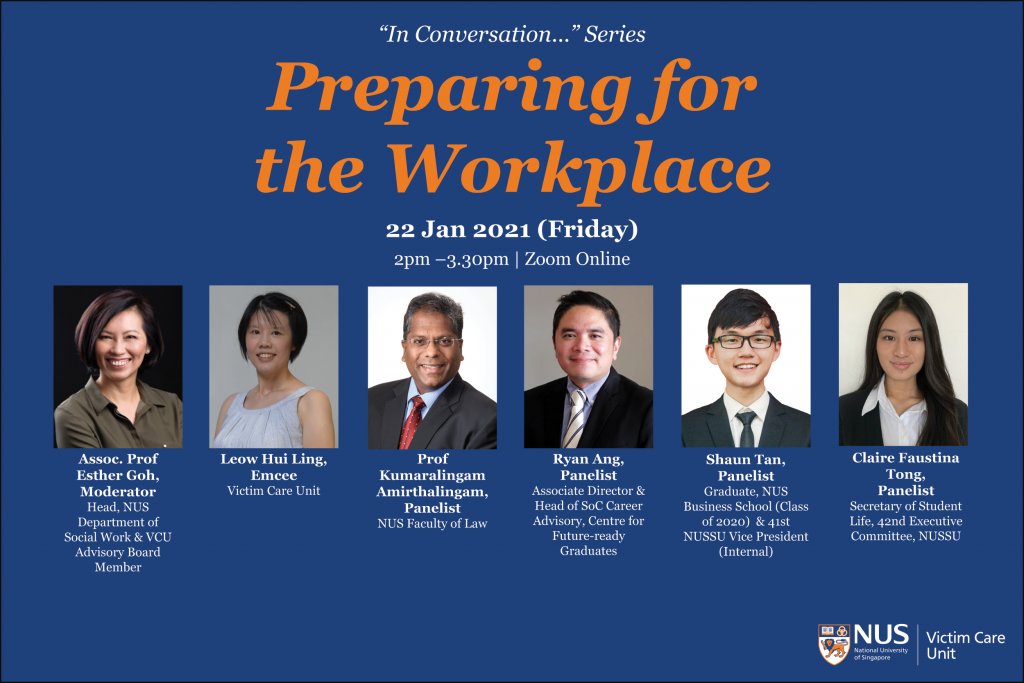
According to a recent survey by Ipsos and AWARE, 2 in 5 workers in Singapore have been sexually harassed at work in the past 5 years. The same survey also found that of these, only 3 in 10 survivors have officially reported about their experiences.
Against this backdrop, the second episode of VCU’s “In Conversation…” Series titled “Preparing for the Workplace” discussed the management of professional boundaries and barriers to reporting workplace sexual harassment, as well as presented recourse options for survivors.
The discussion was hosted by Assoc. Prof. Esther Goh (Head, NUS Department of Social Work & VCU Advisory Board Member)and was joined by Prof. Kumaralingam Amirthalingam (NUS Faculty of Law), Mr. Ryan Ang (Associate Director & Head of SoC Advisory, Centre for Future-Ready Graduates), Mr. Tan Zheng Jie Shaun (Graduate of NUS Business, Class 2020 & Former Internal Vice President, 41st NUSSU) and Ms. Claire Faustina Tong (Secretary of Student Life, 42nd NUSSU).
The discussion opened with some poll questions. When asked if they knew anyone who had experienced workplace sexual harassment, the responses revealed that it is more common than one would think – about 1 in 2 attendees said they do know someone. Attendees were then asked about what they thought were the top three barriers to reporting workplace sexual harassment. Most chose fear of reprisal (93%), followed by the belief that nothing would change (60%), and the fear that no one will believe them (60%).
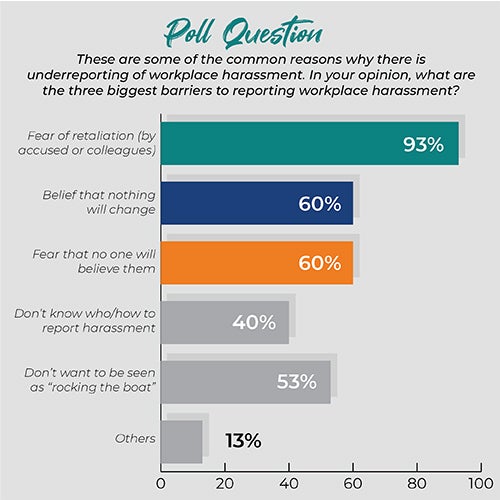
Setting the context, Prof. Kumar from the NUS Faculty of Law described the behaviours that constitute workplace sexual harassment, noting that even ‘less serious’ forms such as inappropriate remarks and jokes – or what some would call “locker-room banter” – should not be tolerated as it is “just as serious in terms of the impact that it can have on people”. He added that addressing workplace sexual harassment cannot just be about empowering victims (e.g., letting them know that they don’t have to put up with it and encouraging them to speak to someone about it) but that others should also learn to recognise that such behaviours are wrong.
Mr. Shaun Tan spoke next about what one can do if they think they are on the receiving end of such behaviours. Fresh in the workforce, he assured that “the ambiguity and fear” that one feels when they start their first job is not uncommon. What he found useful is the “constant catch-ups and follow-ups with friends on the good and bad… experiences in the workplace, which can help your peers be accountable to you and you to be accountable to your peers”.
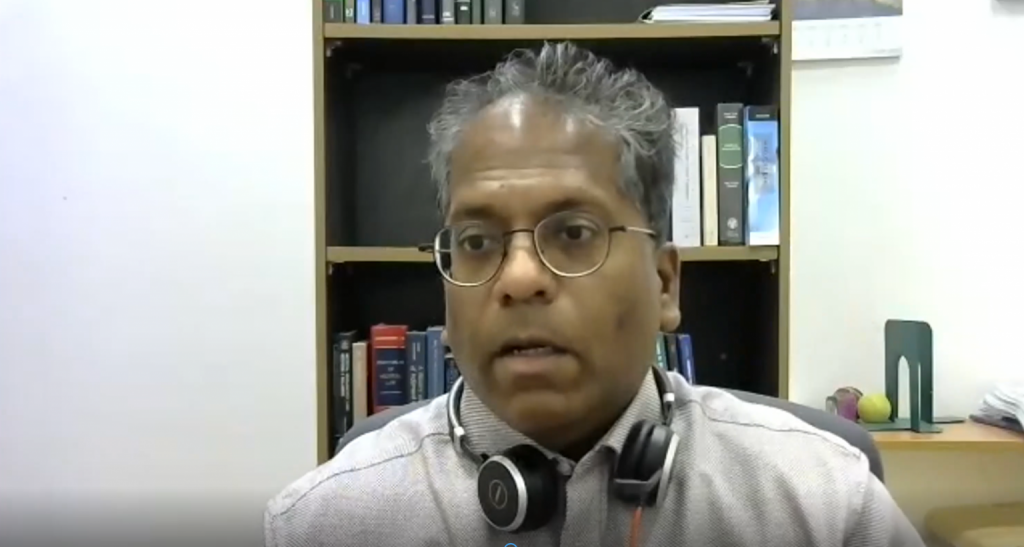
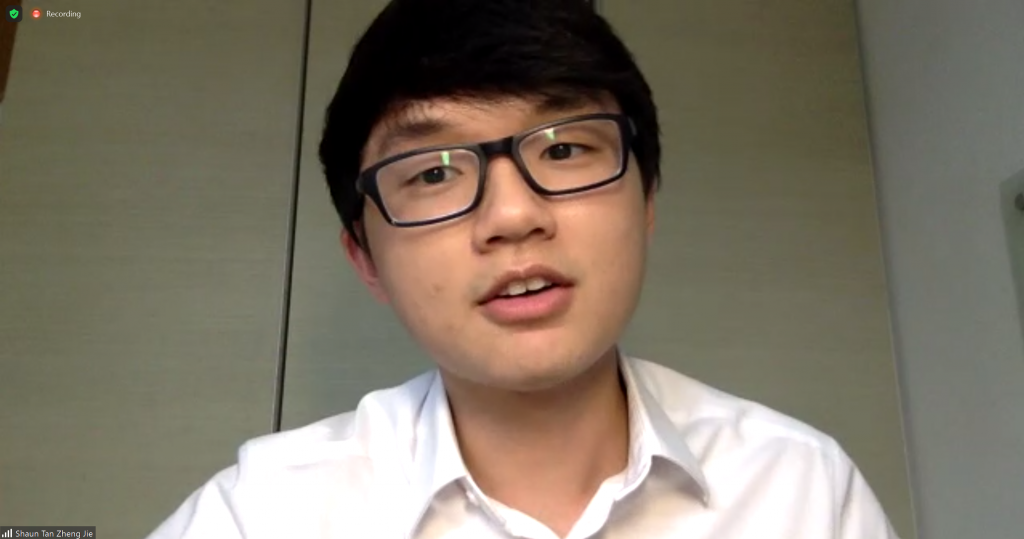
When asked about how one should support a peer, Ms. Claire Tong stressed the importance of avoiding any form of victim-blaming. She also cautioned against probing into the details as much as we might be curious as this can make them feel uncomfortable.
Chiming in, Assoc. Prof Esther Goh – Head of the NUS Department of Social Work and VCU Advisory Board Member – spoke about “starting where they are” as well as the importance of believing what they had shared even if we are unsure of its validity; “if this is their experience, it’s true to them”. She also touched on the emotional burden that can come from being the peer’s only confidant and offered the advice of encouraging that peer to either seek professional help or – if they are really averse to that – to confide in at least one more common friend.

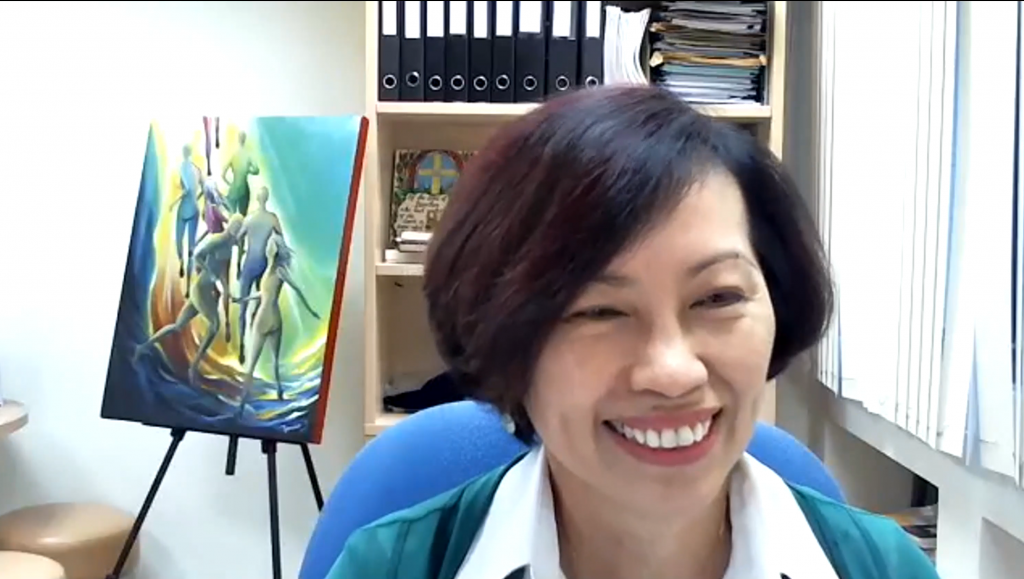
Following a question from the floor on what counts as an “inappropriate compliment,” attendees were invited to rate the appropriateness of some scenarios. Most understood what counts as inappropriate behaviour in the workplace. But when they were asked about ‘grey areas’ – such as in Scenario 3 – attendees were less sure.
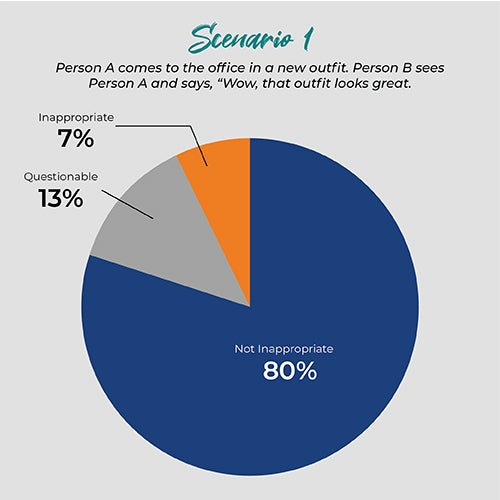
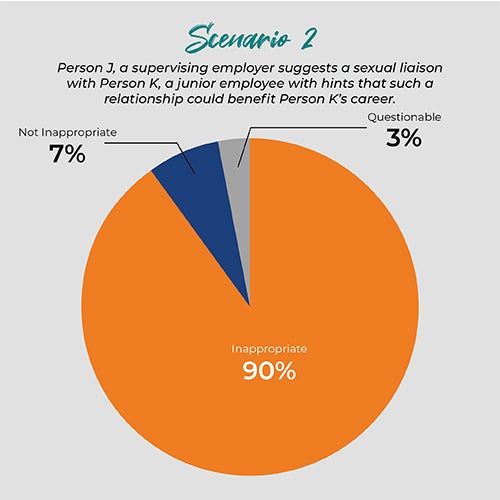
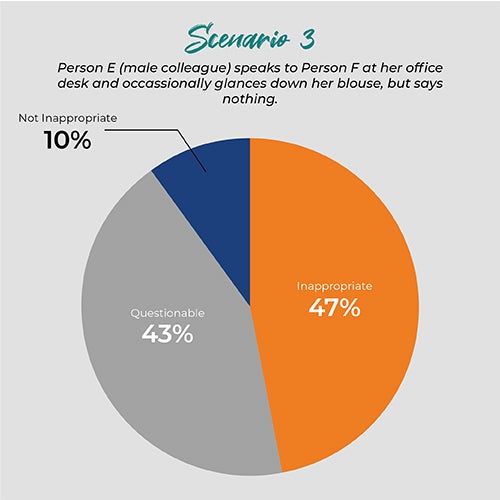
When asked about what one should do if a senior from work asks for a drink after work or offers mentorship over lunch, Prof Kumar stressed that one should not feel obliged to take up the offer. He added that one can also try to invite someone else along. If that senior says “Don’t,” then that is a clear red flag. Prof Kumar also spoke about the inappropriateness of a senior colleague expressing interest in a junior.
Revisiting results from the earlier poll, Prof Kumar spoke about how reporting can be encouraged, such as by having an anti-harassment policy (such as in the Code of Conduct for NUS Staff) and actively implementing it, raising awareness of such information as well as about employee obligations and rights so they know what the OB markers are, and complementing these with information for survivors – their rights, what they can do, and their reporting channels.
Observing that 60% of the attendees chose “Belief that nothing will change” as one of the three biggest barriers, Prof Kumar also stressed the need for clear and proper follow-through by the company/organisation, as well as clear communication of outcomes thereafter (though also noting that some communication might need to be more discrete given the sensitivity of such cases). Ending off, he emphasised that survivors should always have the say in the process and that it should not be taken out of their hands, receive timely updates on the process, and receive proper closure.
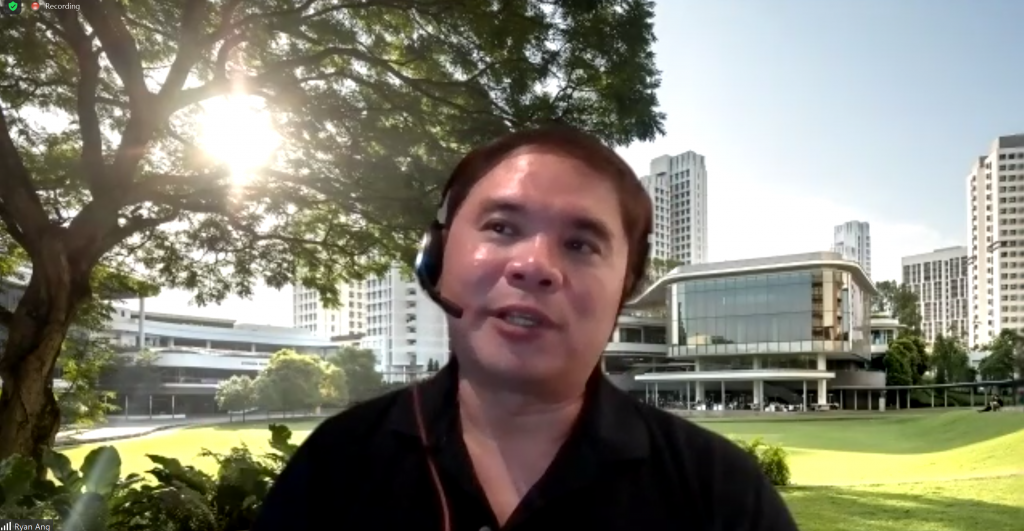
Reflecting on the poll responses, Mr Ryan Ang – Assoc. Director and Head of SoC Advisory at the Centre for Future-Ready Graduates (CFG) – spoke about how the fear of reprisal is not uncommon, especially when the perpetrator is in a position of authority who has vested interest in the internship. He assured that CFG is a “neutral party” who does not have any vested interest in the grading of their internship or in the evaluation of their work performance. Noting that most of the students who have come forward wish to remain anonymous, Mr. Ang also assured that this will be respected throughout CFG’s investigative process.
While salary and work progression are important aspects to look out for when seeking a job, Mr. Shaun Tan stressed that there should be as much, if not more, curiosity about what the workplace culture and environment is like. Similarly, Ms. Claire Tong suggested that seniors at university can be a useful starting point to know more about the workplace culture of a particular industry, and that one should also find out if the company has an anti-harassment policy and what their rights are.
Adding on, Mr. Ryan Ang assured that CFG does their due diligence before posting an internship opportunity on NUS TalentConnect, such as setting the criteria for internship allowance and ensuring that the companies have valid ACRA (Accounting and Corporate Regulatory Authority) registration numbers and use an official office domain email rather than personal email account. CFG will also reach out to students for feedback on how their internship went.
If you or someone you know is affected by sexual misconduct, please reach out to NCU for support by calling our sexual misconduct helpline (+65 6601 4000) or emailing us at ncu_help@nus.edu.sg.
On-Campus Options
If you experience or observe workplace harassment during a summer vacation internship or an internship that is sourced from NUS TalentConnect, you can contact:
Centre for Future-Ready Graduate (CFG)
- Tel: +65 6516 1385
- Email: careers@nus.edu.sg
If your internship is part of a faculty internship module, you can also approach your module coordinator for advice.
Off-Campus Options
If you experience or observe workplace harassment in a non-NUS sourced internship, you may contact:
Tripartite Alliance for Fair and Profressive Employment Practices (TAFEP)
- To seek advice, call: +65 6838 0969
- To make an online report, visit their website.
NUS Care Unit
- University Health Centre,
- 20 Lower Kent Ridge Road,
- #B1-09, Singapore 119080
- For general enquiries:
- +65 6601 3155
- ncu_admin@nus.edu.sg
- Office hours:
Monday - Friday: 9am - 5pm - Website Feedback

